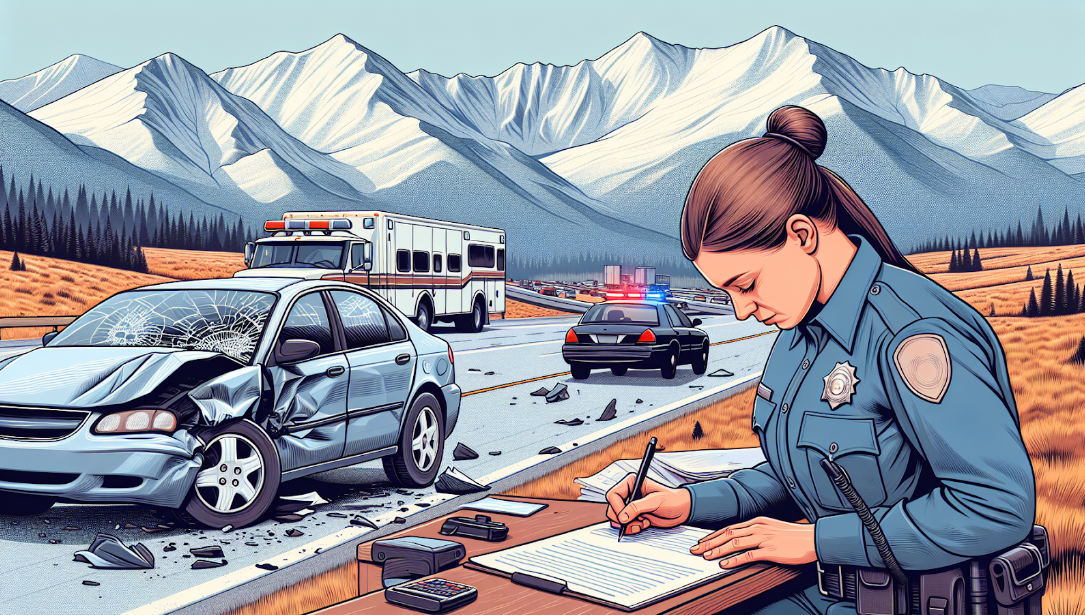Navigating the aftermath of a car accident in Colorado can be both daunting and complex, particularly when it comes to understanding how to get a police report for a car accident. Such reports play a pivotal role in the accident investigation process and serve as essential documents for insurance claims, highlighting the necessity of obtaining them promptly. Obtaining a police report is not only a legal requirement in many cases, especially in incidents involving injuries, hit and run scenarios, or significant property damage, but it also provides a comprehensive account of what happened, incorporating witness statements and the investigating officer’s observations.
This article will guide you through the legal requirements for police reports in Colorado, elucidate how to report a car accident, and underline the importance of these reports in documenting the accident scene, injuries sustained, and the overall accident investigation process. Furthermore, it will detail the crucial role these reports play in insurance claims, including those for car accident personal personal injury and the ways in which they can significantly affect personal injury claims. By understanding the importance of a police report following a car accident, whether you’re filing an insurance claim or speaking with a personal injury lawyer, you’re better equipped to navigate the post-accident landscape efficiently and effectively.
The Legal Requirement for Police Reports in Colorado
Mandatory Reporting Situations
In Colorado, the law mandates that you immediately report any car accident that results in injury, serious bodily injury, death, or property damage. Specifically, Colorado Revised Statute Section 42-4-1606 outlines that you must notify the nearest police agency about the accident’s location and other required information as specified in section 42-4-1603 (2). This immediate notification is crucial, especially if directed by the police to remain at the scene until they complete their investigation.
The obligation to file an accident report extends to all incidents involving either personal injury or property damage. This legal requirement ensures that all necessary details are officially recorded, which can be critical for subsequent legal and insurance processes. It’s important to note that if the police are already at the scene making the report, drivers are exempt from filing another report.
Consequences of Not Reporting
Failing to report a car accident in Colorado carries significant legal consequences. If you do not report an accident, it is classified as a class two misdemeanor traffic offense. This could result in a penalty ranging from 10 to 90 days in jail and/or a fine between $150 to $300. However, the penalties increase with the severity of the accident’s outcomes. For accidents involving injuries, the charge escalates to a class one misdemeanor, and for accidents resulting in death, it could lead to class three felony charges.
Moreover, not reporting an accident can severely impact your ability to claim compensation. An unreported accident can complicate your legal standing in pursuing claims against at-fault drivers, potentially leading to financial, physical, and emotional hardships. Therefore, adhering to the reporting laws not only fulfills a legal obligation but also protects your rights and facilitates the accurate documentation of the incident, which is indispensable for any insurance or personal injury claims.
How to Report a Car Accident in Colorado
Calling 911
If you are involved in a car accident in Colorado and there are injuries, significant property damage, or any immediate hazards, your first step should be to call 911. This is the quickest way to notify the local police, fire department, or medical help. The dispatch operator will guide you through the process and ask for essential details such as the location of the accident, the number of people involved, and the nature of the injuries or damage. It’s crucial to provide accurate information to ensure that the appropriate emergency services are sent to the scene.
Self-Reporting Online
For less severe accidents in Colorado where there are no immediate dangers or injuries, you can report the incident online. The Colorado Department of Revenue provides an online platform where you can submit an accident report. This platform requires you to fill out details about the accident, including the date, time, location, and a description of what happened. You will also need to provide information about the vehicles and drivers involved. This method is efficient and allows for the report to be processed quickly, which can be beneficial when initiating an insurance claim.
Reporting by Mail
If you prefer not to use digital methods or require a more formal documentation process, you can also report a car accident in Colorado by mail. You will need to obtain a traffic accident report form from the Colorado Department of Motor Vehicles (DMV). Once you complete the form, which includes providing comprehensive details about the accident and your contact information, mail it to the address provided by the DMV. This method is particularly useful if you need to include additional documentation, such as photographs or witness statements, which can be crucial for legal or insurance purposes.
Crucial Information in a Police Report
Details Collected by the Police
When you report a car accident, the responding officer meticulously documents every detail observed at the scene. This documentation forms the core of the police report, which is accessible upon request. The report typically includes the exact date and time of the accident, the precise location, and comprehensive details about the involved parties and vehicles 4. Additionally, it may contain statements from drivers, passengers, and witnesses, providing a broad spectrum of perspectives on the event.
In situations where evidence is crucial, such as in hit and run cases or accidents involving significant damages, the police also collect physical evidence from the scene. This might include taking photographs or gathering other forms of material evidence which are then made available to all involved parties.
How This Information Helps Your Case
The information collected and recorded in the police report is vital for several reasons. Firstly, it serves as an objective record of the accident, which helps to establish the facts without bias. This is particularly important if you are involved in legal proceedings or need to make an insurance claim. The report’s details, like the involved parties’ statements and the officer’s observations, can significantly influence the outcome of your insurance claims and any related disputes.
Moreover, having access to the official accident report can protect you from potential unfounded claims by the other parties involved in the accident. It provides a factual basis for any discussions or negotiations regarding compensation and liabilities. In cases where injuries are involved, the report can also be instrumental in supporting personal injury claims, helping to ensure that you or your legal representative have all the necessary information to pursue adequate compensation.
By securing a copy of the police report, you equip yourself with the essential documentation needed to address any legal or financial complications arising from the accident effectively.
The Role of Police Reports in Insurance Claims
Proving Fault
When you’re involved in a car accident, establishing fault is crucial for processing insurance claims. The police report generated at the scene is instrumental in this process. It contains detailed observations by the responding officer, including the positions of the vehicles, weather and road conditions, and any violations of traffic laws. This information is often regarded as reliable by insurance companies and can significantly influence the determination of liability.
For instance, if another driver failed to yield and caused the accident, the police report would typically describe the scenario in detail, making it challenging for the insurance company to dispute these facts. Additionally, citations issued at the scene, such as for speeding or a breathalyzer test, can further solidify your case, proving negligence on the part of the other driver involved in the accident.
Strengthening Compensation Claims
A police report does more than just establish fault; it also strengthens your compensation claims. This document includes comprehensive details like the date, time, and location of the accident, descriptions of the damage to vehicles, and any injuries sustained. Such meticulous documentation helps ensure that all aspects of the accident are considered during your insurance claim process.
Moreover, the police report provides an unbiased account from a credible source, which adds substantial weight to your claim. Insurance adjusters give considerable credence to the information contained within these reports, as they are viewed as objective and thorough. In cases where the extent of damages or injuries might be under scrutiny, the police report serves as a critical piece of evidence that can counter any skepticism from the insurance company, potentially leading to a more favorable outcome for you.
By utilizing the police report, your personal injury attorney can effectively argue your case and negotiate with the insurance company on your behalf, aiming for the maximum possible compensation. This is especially important in Colorado, where the modified comparative negligence system requires showing that the other driver holds more than 50% of the responsibility for the crash to recover damages.
Conclusion
Throughout this article, we have explored the crucial role of police reports in car accident cases within Colorado, underscoring their significance in both legal and insurance realms. We delved into detailed discussions about how these reports contribute to establishing the facts of an accident, providing an unbiased account that serves as a foundational piece in asserting claims and negotiating with insurance companies. Furthermore, we outlined the legal requirements for reporting car accidents in Colorado, emphasizing the potential legal and financial consequences of failing to adhere to these statutes. This comprehensive guide illustrates the indispensable nature of police reports in safeguarding your rights and facilitating the recovery process following an accident.
As we conclude, it’s important to remember the actionable steps and legal nuances involved in obtaining and leveraging a police report to your advantage. Whether you’re navigating insurance claims or seeking compensation for injuries sustained, the detailed documentation offered by these reports is invaluable. For those facing the aftermath of a car accident and in need of expert legal guidance to navigate the complex landscape of insurance and personal injury claims, reach out to the Ronquillo Law Firm for your free consultation. Protecting your interests and ensuring a fair resolution becomes significantly more manageable with the right support and knowledge at your disposal.
FAQs
While it is not mandatory to have a police report to file a car accident claim in Colorado, you can still seek compensation without one.
In Colorado, you are required to report a vehicle accident within 60 days. This applies if the accident results in property damage or personal injury. However, minor accidents might not necessitate police involvement.
Filing a police report correctly is crucial as it accurately documents the collision and the related financial responsibilities. This accuracy supports the efficient processing of insurance claims and clearly identifies the parties responsible for damages.
In Colorado, you are obligated to report a car accident to the police immediately after the incident occurs.


